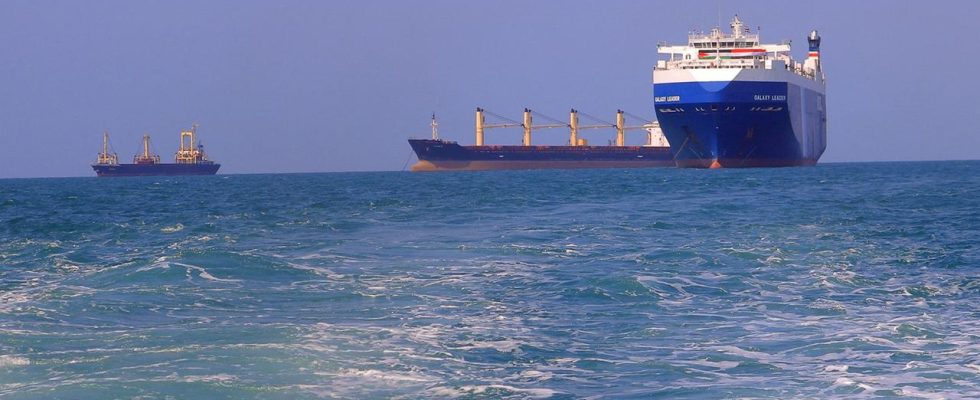faq
The US and allies have repeatedly warned the Houthis in Yemen about attacks on merchant ships in the Red Sea, but these have continued unabated. Now the military strike took place. The most important questions and answers.
Who are the Houthis?
The Houthis are a militant movement in Yemen, located in the south of the Arabian Peninsula. In recent decades they have repeatedly instigated uprisings against the Sunni leadership in the capital Sanaa.
In 2014, rebels marched south from their stronghold in northern Yemen and took Sanaa. They forced the country’s president, Abed Rabbo Mansur Hadi, and the internationally recognized government to flee to the south and later to Saudi Arabia. A grueling civil war ensued, in which a military coalition led by Saudi Arabia became involved with the aim of reinstating the exiled leadership in Yemen. More than 150,000 people have been killed, according to UN estimates, in the war that has unleashed one of the world’s worst humanitarian disasters in Yemen. A ceasefire ended more than a year ago but is still largely observed.
According to a 2019 analysis, the Houthis have around 180,000 to 200,000 armed fighters. They have an extensive arsenal of weapons and are primarily supported by Iran and Hezbollah in Lebanon.
What do the Houthis want?
Above all, the Houthis want to rule the entire Yemen and be recognized for it. In the Gaza war, the Houthis – just like their supporter Iran – want to persuade Israel to stop the attacks. They have declared any ship that comes to or from Israeli ports without aid to the Palestinians in Gaza as a possible target.
What are the consequences of the attacks for shipping?
As of Thursday, the rebels had carried out 27 separate attacks on ships passing through the southern Red Sea, said Pentagon spokesman Pat Ryder. The Houthis’ military spokesman, Jihia Saree, said his group wanted to prevent Israeli ships from navigating the waters and the Gulf of Aden “until Israeli aggression against our steadfast brothers in the Gaza Strip ceases.”
However, only a few of the ships attacked had direct connections to Israel. However, merchant ships were damaged during the Houthis’ actions, and international shipping companies were subsequently forced to reroute their freighters and allow them to take the much longer route around the Cape of Good Hope.
How is the international community reacting?
The USA and other countries had warned the Houthis for weeks. Washington said that if the rebels did not stop their drone and missile attacks on merchant ships in the Red Sea, they would face serious consequences.
Because the attacks didn’t stop, Pentagon chief Lloyd Austin announced the establishment of a protection force for merchant ships in the Red Sea, which includes the USA and more than 20 other countries.
If alliance warships had not escorted the ships and intercepted missiles, ships would certainly have been hit and perhaps even sunk, including a freighter carrying jet fuel, a senior U.S. government official said. There were cases where it was “extremely close”.
On Friday night, the USA and Great Britain, with the help of allies, bombed Houthi positions in Yemen. In a joint statement, they justified the attacks with the right to self-defense. “These precision strikes were intended to disrupt and weaken the Houthis’ ability to threaten global trade and the lives of international seafarers on one of the world’s most important waterways,” it said.
What interests does the USA pursue?
There is currently no statement from the USA as to why the military strike against the Houthis was only carried out now. Observers attribute the timing primarily to concerns in the US government about the shaky ceasefire in Yemen being undermined. The White House is also concerned that the conflict in the Middle East could spread.
Although the USA had recently responded to numerous attacks by militias allied with Iran in Iraq and Syria with air strikes, they seemed to follow a different calculation in dealing with the Houthis until the end. The Pentagon has previously reported that US naval ships had shot down rebel drones fired in their direction because they were classified as a threat. At the same time, representatives of the Ministry of Defense later emphasized that they had concluded that the US warships were not the target.
With regard to the attacks by pro-Iranian groups in Iraq and Syria, Pentagon spokesman Ryder said that the US military counterattacks had not led to an expansion of the conflict in the Middle East. It now remains to be seen whether there will be an escalation in the region following the American and British attacks on weapons depots and other facilities belonging to the Houthis.
Source: AP, dpa

